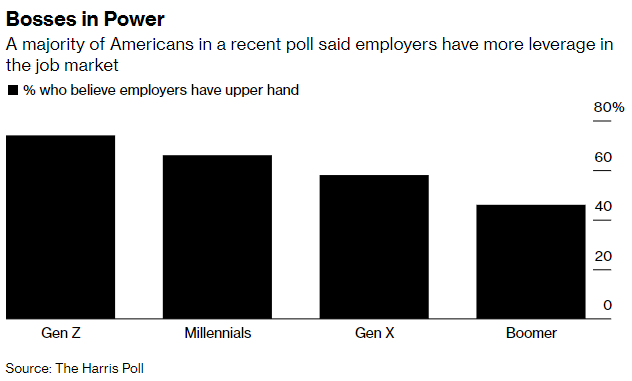Brief • 5 min Read
In The Harris Poll Tracker (Week 130) fielded from August 19th to 21st, 2022 among 2,048 U.S. adults, Americans are more concerned about their financial health than their physical health. While 8 in 10 (81%) worry over a potential U.S. recession and two-thirds (64%) over affording their living expenses, less are concerned with the BA.5 variant (58%) or Monkeypox (56%).
New stories this week include a survey with Bloomberg showing that employees suddenly feel their employers have more leverage, especially in the face of growing layoffs. Also, Americans aren’t too happy with billionaires.
Then, with the New York Times, we document the growing trend in sharing one’s location with friends and how health care knowledge gaps are costing Americans. Finally, we dive into the Harvard CAPS-Harris Poll data to document American opinion on the Russia-Ukraine war six months later.
Check out our America This Week: From The Harris Poll podcast on Spotify and Apple Podcasts with me, John, and our CSO Libby Rodney on this week’s data and more.
The Tables Have Turned: Bloomberg-Harris Poll
In our latest poll with Bloomberg, U.S. employees say they’re losing the upper hand as layoffs mount, along with concerns over the economy, pay, and remote work.

- Leverage is in the hands of employers: (57%) of American workers believe companies have more power in the job market these days – a (5%-pt) increase from January. And as the above chart shows, younger employees especially feel this way:
- Leaving employees to feel less empowered: (59%) of workers indicated that while they would like a raise, they don’t feel comfortable asking for one.
- And just half (51%) of employees believe they can negotiate to work partially or fully from home without fear of repercussions.
- Feeling like staying put: Nearly two-thirds (62%) said current economic fluctuations are why they plan to stay at their current jobs.
Takeaway: With employee wages not keeping up with inflation, “It’s a little bit of a game of chicken,” says Harris Poll CEO John Gerzema, “The calculus is: I either want to lock in greater pay right now by asking for a raise or move to another job to get a raise. However, being worried about a recession, I’m now also consciously thinking about my job security”. So, for many now, the choice seems to be retrenchment.
Americans Aren’t Impressed With Billionaires
While six-in-ten Americans look up to billionaires, it doesn’t mean that Americans are overwhelmingly pleased with the behaviors of the ultrawealthy, as seen by our latest report.
- A mounting disconnect between expectations and actions: While seven in ten Americans strongly believe that billionaires have a responsibility to better society, they feel the ultra .0001% are not currently doing enough.
- That’s because two-thirds of Americans (66%) believe economic inequality is a serious national issue, with nearly half (46%) saying that billionaires make it harder to achieve their own American Dream (LGBTQIA+: 68%, Gen Z: 59%, Millennials: 58%).
- Feelings of fairness rise to the top of Americans’ concerns with billionaires: Two-thirds (65%) think that billionaires don’t pay their fair share of taxes, (58%) believe that billionaires’ activities contribute to the rising inflation, and (58%) share resentment over billionaires’ wealth accumulation during the pandemic.
Takeaway: “The self-made journey of wealth accumulation has always been foundational to the American dream, once with millionaires and now billionaires,” says Libby Rodney, Futurist and Chief Strategic Officer at The Harris Poll. “From an individual point of view, many Americans still want to become billionaires, but from a collective sensibility, the story is shifting as billionaires are being painted as a barrier to Americans achieving their personal dreams, while economic inequality grows to a national crisis point.”
The Danger in Location Apps: New York Times-Harris Poll
Introduced ten years ago, the Find My app has slowly become a popular way to keep track of friends. But in our survey with The New York Times; however, the ease of sharing one’s location speaks to a larger discussion around data tracking and privacy among users.

- Location sharing is a younger thing: (77%) of Millennials and (69%) of Gen Z report having activated location-sharing features at least sometimes (v. gen pop: 62%).
- Almost half (48%) of those who use location-sharing apps report wanting to share their location with other people as a reason why, and two in five (37%) say they feel safer when they have location-sharing features activated.
- But sharing locations comes with privacy concerns: The New York Times previously found that dozens of companies use smartphone locations to help advertisers and even hedge funds, all unbeknownst to users.
- Sadly, there are more serious consequences in a post-Roe world, as NBC News reported that Facebook turned over chat messages between a mother and daughter who are now charged over an illegal abortion.
Takeaway: While previous research with Permutive details a hesitancy among American and U.K. respondents in sharing their data with brands – (42%) of consumers would opt out of data sharing ultimately with advertisers – the Find My case study may detail how, in reality, Americans are willing to share data when they have complete control and knowledge of how the data is being used (e.g., by their friends, their uber, etc.). We used to trade privacy for convenience gleefully, but now at what cost?
Why We Make Poor Choices When It Comes To Our Health: Justworks-Harris Poll
In a recent collaboration with Justworks, we find a significant knowledge gap between American workers and their health insurance benefits and coverage, a gap that could end up costing them.
- Over half of employed Americans (54%) don’t know the full scope of what their current health insurance offers them.
- Sticking with what they know, for better or worse: Nearly two-thirds (62%) said they don’t usually change their health insurance selections each year because it’s too stressful. Half (49%) even report feeling pressure to select the most expensive health insurance option to ensure they have the coverage that they need.
- Beyond insurance, Americans are also lacking knowledge about dietary supplements: Half of Americans (49%) mistakenly believe that most dietary supplements have been declared safe and effective by the U.S. Food and Drug Administration, according to our HealthDay survey.
Takeaway: Companies might be tempted to cut corners and costs given the opaque nature of corporate healthcare plans and employee reticence to dig deeper into their coverage. But health insurance benefits attract and retain talent: Employees cite having specific health insurance benefits as necessary when looking for a new job, and their current coverage is an important reason for staying in their role (78%, 63%, respectively). Businesses can also bolster communication since (44%) of workers feel uncomfortable asking H.R. insurance questions – leading to series such as Axios’ new series, Bill and Confused, which investigates confusing insurance claims and bills for everyday Americans.
Ukraine At War, Six Months Later: Forbes-Harvard CAPS/Harris Poll
August 24th marks the sixth month anniversary of Russia’s invasion of Ukraine, and according to recent Harris Poll COVID-19 Weekly Tracker and Harvard CAPS/Harris Poll data, as featured in Forbes, Ukraine is still a top-of-mind concern for many Americans.
- Strong support for Ukraine softens (slightly): As of this past weekend, our weekly Harris Poll survey found that 7 in 10 Americans (70%) remain concerned about the war – but it was a (13%-pt) decrease from the heightened concern in mid-March.
- Americans would be happy to help: A late July Harvard CAPS-Harris poll found half of the registered voters (53%) saying the U.S. should send billions more in military equipment to Ukraine if Russia continues its invasion.
- Partly because they believe U.S. support would make a difference, with over half of voters (55%) believing that U.S. arms shipments would let Ukraine push back Russia and win the war compared to (45%) saying it’s unlikely to alter the course of the war.
Takeaway: American concern extends beyond a general worry for global neighbors to a more significant fear around the use of nuclear weapons in warfare. Three-quarters of voters (72%) are concerned that the war in Ukraine will lead Russia to use nuclear weapons inside the country. The concern isn’t too far-fetched as the U.N. calls for the immediate withdrawal of Russian troops from the Ukrainian Zaporizhzhia nuclear plant amid fears of a catastrophic nuclear accident.
As a public service, our team has curated key insights to help leaders navigate COVID-19. Full survey results, tables, and weekly summaries can be accessed for free at The Harris Poll COVID-19 Portal. We will continue to actively field on a regular cadence to track the shifts in sentiment and behaviors as the news and guidelines evolve.
Subscribe for more Insights
Subscribe to our newsletter for the latest trends in business, politics, culture, and more.
Download the Data
This survey was conducted online within the U.S. by The Harris Poll from August 19th to 21st, among a nationally representative sample of 2,048 U.S. adults.
Download
Subscribe for more Insights
Subscribe to our newsletter for the latest trends in business, politics, culture, and more.
Download the Data
This survey was conducted online within the U.S. by The Harris Poll from August 19th to 21st, among a nationally representative sample of 2,048 U.S. adults.
DownloadRelated Content







